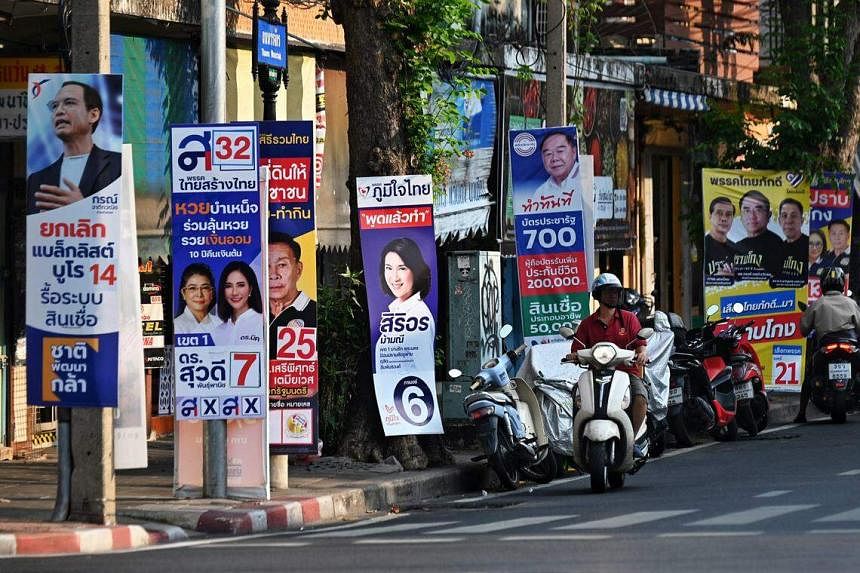On Sunday, a group of Pheu Thai Party supporters encouraged the party to allow the Move Forward Party to establish a coalition government without its assistance, expressing displeasure with the “disrespect” shown to Pheu Thai.
The Pheu Thai leader stated that he would examine the group’s viewpoint.
A group of red-clad fans protested outside Pheu Thai’s offices.
Niyom Nopparat, the group’s leader, stated that Pheu Thai should resign from the Move Forward Party’s bid to establish a coalition government since Pheu Thai had been “disrespected” in the process.
“The Pheu Thai fan club wants to encourage parties to carefully consider whether a government can be formed without the Pheu Thai Party,” he stated.
The group’s petition came when Pheu Thai and Move Forward were battling over the position of the House Speaker.
According to the group’s statement, Pheu Thai should allow Move Forward, the election winner, to form a government first. If Move Forward fails to do so, Pheu Thai, which won the second most House seats, will take its place.
Meanwhile, Pheu Thai head Cholnan Srikaew stated that the party would carefully study the request made by the group.
“The party is listening to opinions from all parties, especially supporters, who the Pheu Thai Party must value,” Dr Cholnan stated.
The Pheu Thai leader stated that Move Forward would meet with coalition partners on Tuesday and that he anticipated them to agree on the identity of the House Speaker.
“We must seek the most advantageous conditions for our relationship… There must be a balance. There can be no clear winner or loser. “Everyone will be happy then,” Dr Cholnan stated.
Most foresee problems forming govt coalition in Thailand
According to a Suan Dusit Rajabhat University opinion poll, a majority of Thais are skeptical of Move Forward and seven other parties’ capacity to establish a new government, despite the fact that they have a majority of MPs (313 in the House of Representatives).
On May 24-26, 1,352 people nationwide were polled online about the ongoing attempt by the Move Forward, Pheu Thai, Prachachat, Thai Sang Thai, Seri Ruam Thai, Fair, Palang Sangkhom Mai, and Peu Thai Rumphalang parties to form a coalition government with 313 MPs, more than half of the 500-member House of Representatives.
When asked if they had reservations that the new government could be established, 67.83% responded “yes,” citing a variety of causes, including conflicts among them. They claimed that the process was tainted by political games and uncertainty about how MPs and senators would vote when a joint session of Parliament was called to approve the appointment of a new prime minister.
On the other hand, 32.17% stated they were unconcerned. They felt that the eight parties, led by Move Forward, could reach an agreement through a democratic process in which everyone respected one another.
When asked if they were optimistic that the process of forming a new administration will be smooth, 58.33% replied no, while 41.67% said yes.
Most believe misinformation used during Thailand’s election
Meanwhile, according to a survey conducted by the National Institute of Development Administration, or Nida Poll, the majority of people believe political parties spread falsehoods in the run-up to the May 14 election, both to defame opponents and to gain popularity.
When asked if they thought the parties utilised social media to criticise or defame rivals, 56.49% replied “yes” – 31.22% to a moderate degree and 25.27% a lot. On the other hand, 23.59% responded “definitely not,” while 19.31% said “yes, but only slightly.” The remaining 0.61% had no response or were uninterested.
When asked if they thought political parties used misinformation on social media to gain popularity, 57.48% replied “yes” – 30.08% to a moderate amount and 27.40% a lot. On the other hand, 22.06% responded “definitely not” and 19.54% said “yes, but only slightly.” The remaining 0.92% had no response or were uninterested.
When asked if they thought foreign countries intervened in the election, 78.77% responded “no” – 56.56% said “not at all” and 22.21% stated “to a small extent.” On the other hand, 8.17% replied “yes, a lot” and 11.76% stated “sort of.” The remaining 1.30% had no response or were uninterested.
On May 18-22, phone interviews were conducted with 1,310 persons aged 18 and above from diverse levels of education, occupations, and incomes around the country to assemble their thoughts on the material, both genuine and fraudulent, issued by the parties and distributed on social media.





